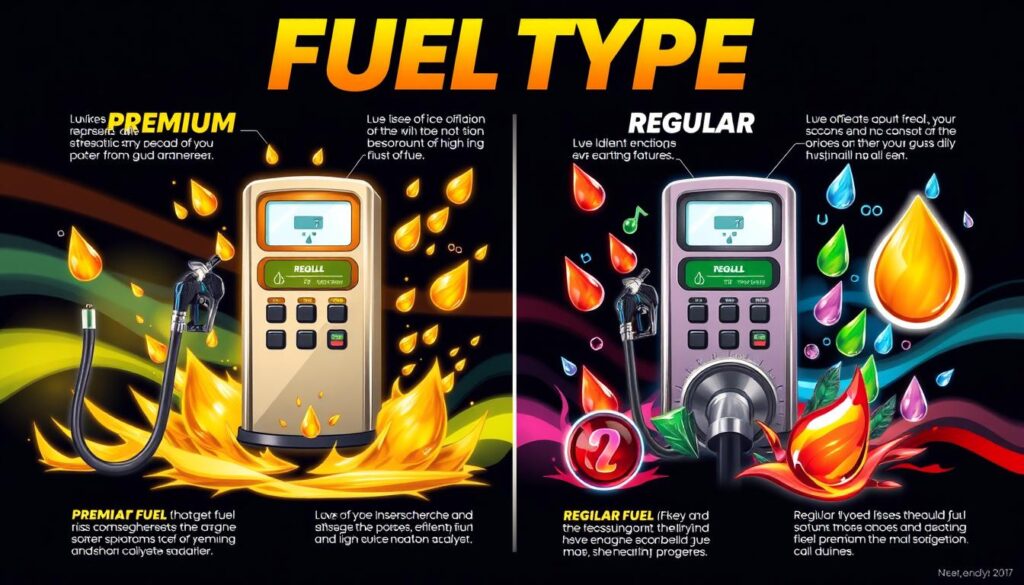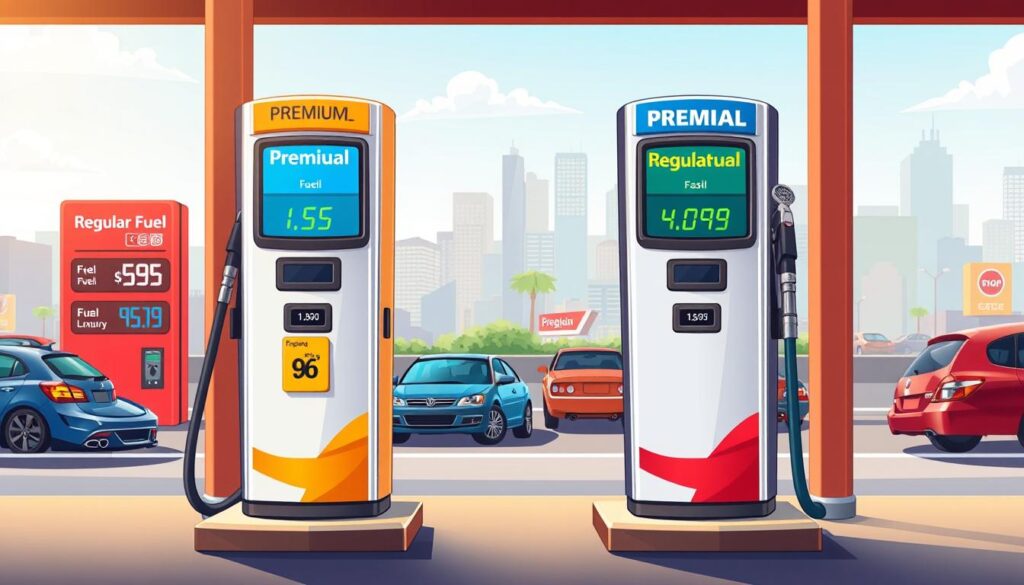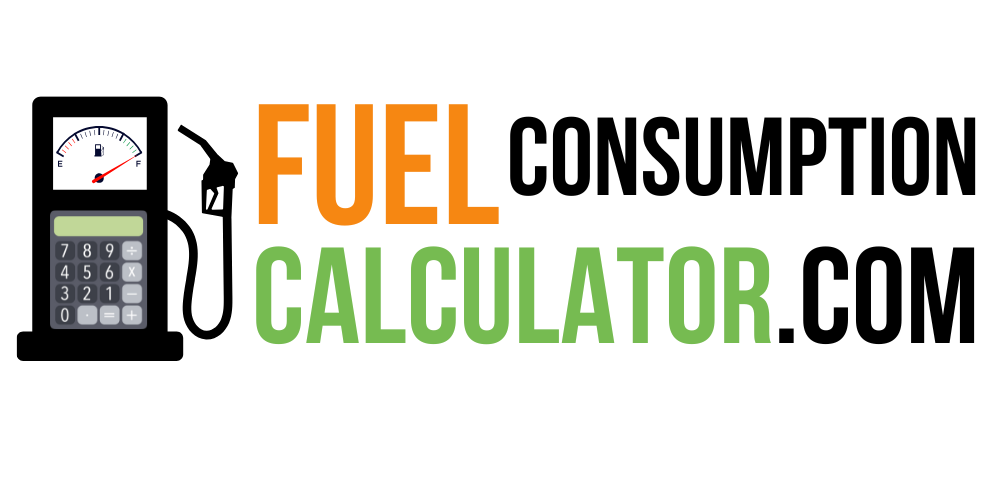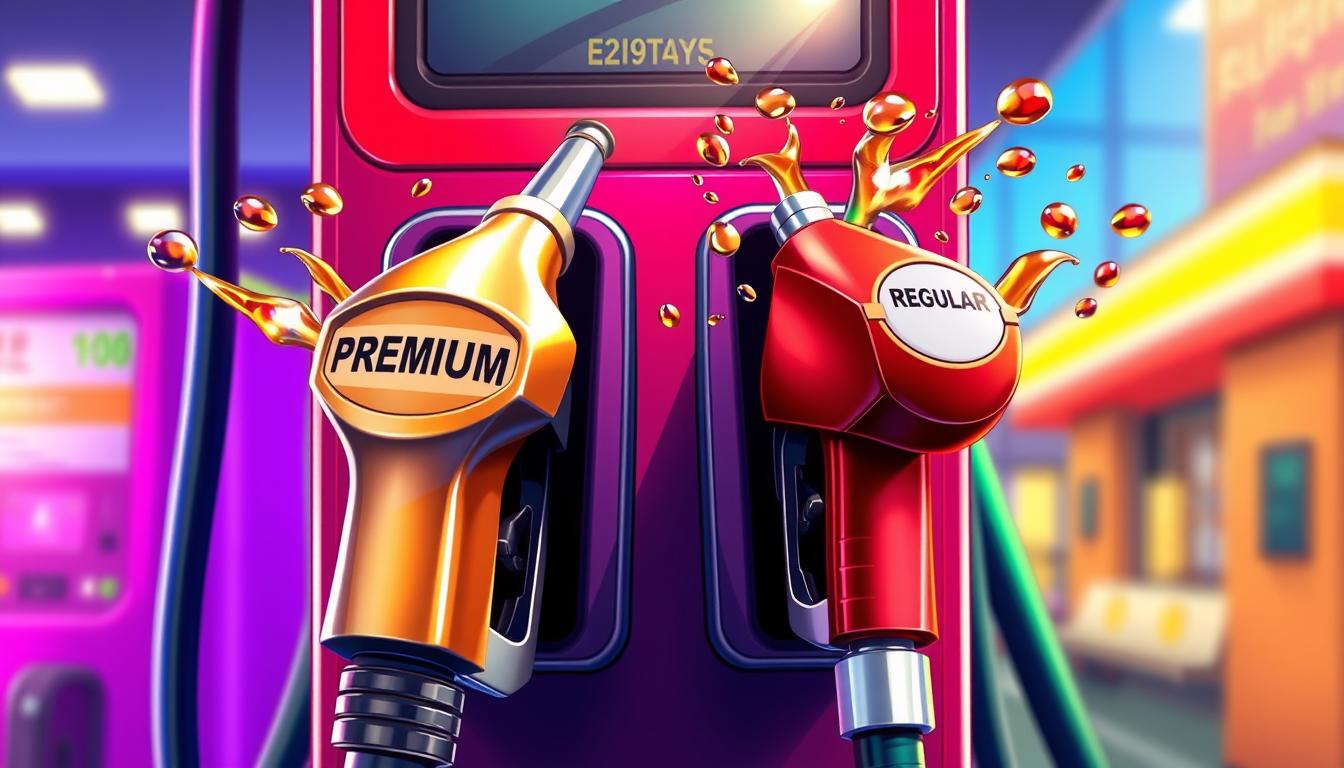Choosing between premium and regular fuel can seem tricky. But knowing the differences is key to saving money at the pump. We’ll look at what makes premium fuel different from regular, including octane levels, engine needs, and costs.
Contents
Key Takeaways
- Octane ratings help prevent early ignition, important for high-performance engines.
- Premium fuel usually means better engine performance, more fuel efficiency, and fewer emissions than regular fuel.
- The price difference between premium and regular fuel can change, so think about the benefits and costs.
- Always check your car’s manual to see what fuel type it recommends.
- Choosing between premium and regular fuel also affects the environment, with efficiency and emissions being factors.
Understanding the Differences
Choosing the right fuel for your car can be confusing. The main difference between premium and regular fuel is their octane levels. Octane helps prevent the fuel from igniting too early, known as “knocking.”
Octane Ratings Explained
Premium gas has an octane rating of 91 to 94. It’s made for high-performance engines that need fuel that resists early ignition well. Regular gas, with an octane rating of 87, is best for most cars.
It’s important to use the right octane fuel for your car. If your car needs premium fuel, it can help prevent engine knock. This can make your car run better and might save on fuel. But, using premium fuel in a car that only needs regular won’t help and will cost more.
| Fuel Type | Octane Rating | Suitable Vehicles |
|---|---|---|
| Premium | 91-94 | High-performance, luxury, and turbocharged engines |
| Regular | 87 | Most standard gasoline-powered vehicles |
Knowing about octane rating, fuel combustion, and engine knocking helps pick the right fuel quality for your car. Making the right choice can improve your car’s performance and efficiency. It also helps you save on fuel costs.
Premium Fuel vs Regular Fuel: Decoding the Pump Puzzle
Choosing between premium and regular fuel for your car can be tricky. Premium fuel might give better engine performance and fuel efficiency in some cars. But, it’s not always needed. Many car engines work best with regular fuel’s lower octane rating.
Using the wrong fuel can harm your engine and lower its performance. It’s key to check your car’s manual for the right fuel type. This makes sure your engine gets the fuel it was made for, improving its efficiency and life.
The perks of premium fuel might not be as big as some think. It might slightly improve engine performance, but the difference in everyday driving is usually small. Choosing between premium and regular fuel depends on cost, what your engine needs, and what you prefer.
Fuel Type Recommendations and Engine Performance
Your car’s maker has advice on the best fuel type. Many modern engines do well with regular fuel. Using premium might not make a big difference in how your engine performs or how efficiently it uses fuel.
- Consult your owner’s manual to determine the recommended fuel type for your vehicle.
- Using the wrong fuel type can lead to increased engine wear, reduced performance, and potentially even damage to your engine over time.
- While premium fuel may offer a slight boost in engine performance, the real-world difference is often minimal, especially for everyday driving conditions.
| Fuel Type | Octane Rating | Engine Recommendations | Potential Benefits |
|---|---|---|---|
| Regular | 87-88 | Most standard, non-high-performance engines | Affordable, meets basic engine requirements |
| Premium | 91-93 | High-performance engines, turbocharged/supercharged engines | Improved engine performance, potential for increased fuel efficiency |
“Using the wrong fuel type can lead to increased engine wear and decreased performance, so it’s essential to consult your owner’s manual to determine the appropriate fuel recommendation for your vehicle.”

Engine Recommendations and Fuel Options
Consulting Your Owner’s Manual
Your owner’s manual is the best place to find out what fuel your car needs. It tells you the best fuel type and octane rating for your engine. This is because the engine in your car is made to work best with these specifications.
Following the fuel advice in your manual is key. Ignoring it can hurt your car’s performance, make it less fuel-efficient, and even damage the engine over time. It’s important to listen to the manufacturer to keep your engine running right and prevent problems from using the wrong fuel.
| Fuel Type | Octane Rating | Recommended for: |
|---|---|---|
| Regular Gasoline | 87 | Most standard passenger vehicles |
| Midgrade Gasoline | 88-90 | Some turbocharged or high-performance engines |
| Premium Gasoline | 91-93 | High-performance and luxury vehicles with high-compression engines |
Even if your car can run on regular gasoline, using the recommended premium fuel can make it run better and use less fuel. But, if your car needs premium fuel, using lower octane can really harm the engine and should be avoided.
The Cost Considerations
Choosing between premium and regular gasoline for your car can be tricky. The price difference can be up to 50 cents per gallon. Premium fuel might give better performance and efficiency in some cars. But, it might not be worth it if your car only needs regular fuel.
Let’s look at the costs more closely. Premium gasoline has more additives and detergents than regular fuel. These can help your engine last longer and run better. But, how much this affects your driving and maintenance costs depends on your car and how you drive.
| Fuel Type | Octane Rating | Price Difference | Fuel Efficiency Impact |
|---|---|---|---|
| Regular | 87 | — | — |
| Plus | 88-90 | +10-20 cents/gallon | Slight improvement |
| Premium | 91-94 | +20-50 cents/gallon | 2-3 mpg improvement |
When deciding between premium and regular fuel, think about engine life, maintenance costs, and how you drive. Check your car’s manual to see what fuel it needs. This will help you choose wisely, balancing performance, efficiency, and saving money.

Environmental Impact and Fuel Efficiency
Choosing between premium and regular fuel affects the environment. Cars made for premium fuel might use less fuel and emit less pollution. If 80% of light-duty vehicles in the U.S. used higher-octane fuel by 2040, it could cut carbon dioxide emissions by 35 million tons a year.
But the environmental benefits are small, and premium fuel costs more. Cars on higher-octane fuel use 3 to 4.5 percent less gas. This could save up to $6.4 billion a year by 2040. Also, changing the octane rating system could make cars more efficient and cut emissions even more.
Choosing between premium and regular fuel depends on your car and what you value. Think about the environment, but also consider your car’s needs and your budget. Making a smart choice helps balance your driving habits with your eco-friendly goals.
Source Links
- http://www.forwardlook.net/forums/forums/thread-view.asp?tid=19270&DisplayType=nested&setCookie=1 – Viewing a thread – 1958 DeSoto Electrojector
- https://mycarheaven.com/2024/05/choosing-the-right-motor-oil-optimizing-performance-and-protecting-your-engine/ – Choosing the Right Motor Oil: Optimizing Performance and Protecting Your Engine
- https://nap.nationalacademies.org/read/24717/chapter/5 – 3 Light-Duty Vehicle Technologies and Fuels | Review of the Research Program of the U.S. DRIVE Partnership: Fifth Report
- https://www.progressive.com/answers/premium-vs-regular-gas/ – Premium vs. Regular Gas: Which Is Best for Your Car?
- https://tidewatertechtrades.edu/blog/unleaded-premium-gas/ – What is the Difference between Regular Unleaded and Premium Gas? – Tidewater Tech Trades
- https://www.crxcommunity.com/threads/new-old-87-fuel-pump-questions.46435/ – New Old ’87 Fuel Pump Questions
- https://hepg.hks.harvard.edu/files/hepg/files/tierney_-_decoding_electricity_prices.pdf – Microsoft Word – Analysis Group – Tierney – Electricity Report Final 10-22-07.doc
- https://www.cartalk.com/content/premium-vs-regular-0 – Premium vs. Regular
- https://www.berrymanproducts.com/regular-vs-premium-gas-explained/ – No title found
- https://www.autostoday.com/blog/premium-vs-regular-gas-a-comprehensive-guide – Navigating the Premium vs. Regular Gas Dilemma
- https://www.crossroadshelpline.com/blog/regular-gas-instead-of-premium/ – Can I Use Regular Gas Instead of Premium? – Crossroads Helpline
- https://caradvise.com/the-simple-guide-to-regular-plus-and-premium-gas/ – The Simple Guide to Regular, Plus, and Premium Gas –
- https://news.mit.edu/2014/premium-gas-could-save-fuel-money-1028 – Shifting up to higher octane
- https://newsroom.aaa.com/wp-content/uploads/2016/09/Premium-Fuel-Fact-Sheet-FINAL.pdf – Premium Fuel – Fact Sheet – DRAFT (EE).pub

Hi, I’m Sufiyan, the developer behind this platform. I created FuelConsumptionCalculator.com to simplify fuel tracking for everyone — because understanding your vehicle shouldn’t require a degree in mechanics. I’m always working on adding more tools and content to make this site even more useful

